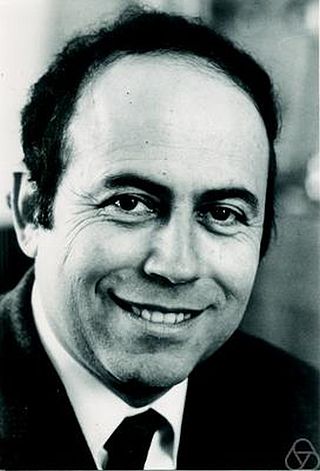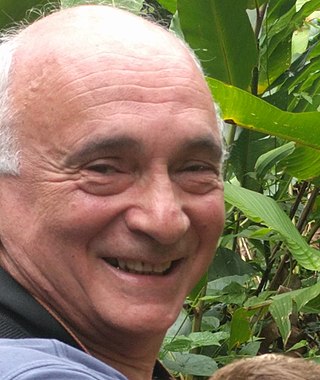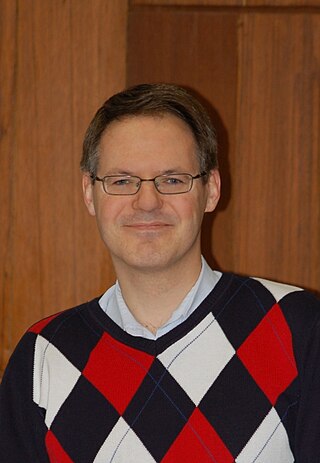
George Boole Jnr was a largely self-taught English mathematician, philosopher and logician, most of whose short career was spent as the first professor of mathematics at Queen's College, Cork in Ireland. He worked in the fields of differential equations and algebraic logic, and is best known as the author of The Laws of Thought (1854), which contains Boolean algebra. Boolean logic, essential to computer programming, is credited with laying the foundations for the Information Age alongside the work of Claude Shannon.

Rudolf Carnap was a German-language philosopher who was active in Europe before 1935 and in the United States thereafter. He was a major member of the Vienna Circle and an advocate of logical positivism.

The Hebrew University of Jerusalem is a public research university based in Jerusalem, Israel. Co-founded by Albert Einstein and Chaim Weizmann in July 1918, the public university officially opened in April 1925. It is the second-oldest Israeli university, having been founded 30 years before the establishment of the State of Israel but six years after the older Technion university. The HUJI has three campuses in Jerusalem, one in Rehovot, one in Rishon LeZion and one in Eilat. Until 2023, the world's largest library for Jewish studies—the National Library of Israel—was located on its Edmond J. Safra campus in the Givat Ram neighbourhood of Jerusalem.

Michael Oser Rabin is an Israeli mathematician, computer scientist, and recipient of the Turing Award.

Amir Pnueli was an Israeli computer scientist and the 1996 Turing Award recipient.

Saharon Shelah is an Israeli mathematician. He is a professor of mathematics at the Hebrew University of Jerusalem and Rutgers University in New Jersey.
Andrew William Roscoe is a Scottish computer scientist. He was Head of the Department of Computer Science, University of Oxford from 2003 to 2014, and was a Professor of Computer Science. He was also Fellow of University College, Oxford until 2024.

Israel Academy of Sciences and Humanities, based in Jerusalem, was established in 1961 by the State of Israel to foster contact between Israeli scholars in the sciences and humanities and create a think tank for advising the government on research projects of national importance. Its members include many of Israel's most distinguished scholars.

Alexander Bogomolny was a Soviet-born Israeli-American mathematician. He was Professor Emeritus of Mathematics at the University of Iowa, and formerly research fellow at the Moscow Institute of Electronics and Mathematics, senior instructor at Hebrew University and software consultant at Ben Gurion University. He wrote extensively about arithmetic, probability, algebra, geometry, trigonometry and mathematical games.
Formal epistemology uses formal methods from decision theory, logic, probability theory and computability theory to model and reason about issues of epistemological interest. Work in this area spans several academic fields, including philosophy, computer science, economics, and statistics. The focus of formal epistemology has tended to differ somewhat from that of traditional epistemology, with topics like uncertainty, induction, and belief revision garnering more attention than the analysis of knowledge, skepticism, and issues with justification.
Dov M. Gabbay is an Israeli logician. He is Augustus De Morgan Professor Emeritus of Logic at the Group of Logic, Language and Computation, Department of Computer Science, King's College London.
Patrick Colonel Suppes was an American philosopher who made significant contributions to philosophy of science, the theory of measurement, the foundations of quantum mechanics, decision theory, psychology and educational technology. He was the Lucie Stern Professor of Philosophy Emeritus at Stanford University and until January 2010 was the Director of the Education Program for Gifted Youth also at Stanford.

Noga Alon is an Israeli mathematician and a professor of mathematics at Princeton University noted for his contributions to combinatorics and theoretical computer science, having authored hundreds of papers.

Haim Shapira (1962-) is an Israeli mathematician, pianist, speaker, philosopher and game theorist. He writes in Hebrew, and his books have been translated into English, Spanish, German, Portuguese, Italian, Russian, Bengali and Korean. He is a lecturer in Israel, and was a speaker at TEDxJaffa on game theory and strategy. His first two books in English are Happiness and Other Small Things of Absolute Importance and Gladiators, Pirates and Games of Trust. He also arranged and performed music on the soundtrack for John Wick: Chapter 2.

Tomasz "Tomek" Bartoszyński is a Polish-American mathematician who works in set theory.

Gil Kalai is an Israeli mathematician and computer scientist. He is the Henry and Manya Noskwith Professor Emeritus of Mathematics at the Hebrew University of Jerusalem, Israel, Professor of Computer Science at the Interdisciplinary Center, Herzliya, and adjunct Professor of mathematics and of computer science at Yale University, United States.

Ran Raz is a computer scientist who works in the area of computational complexity theory. He was a professor in the faculty of mathematics and computer science at the Weizmann Institute before becoming a professor of computer science at Princeton University.
Eli Upfal is a computer science researcher, currently the Rush C. Hawkins Professor of Computer Science at Brown University. He completed his undergraduate studies in mathematics and statistics at the Hebrew University, Israel in 1978, received an M.Sc. in computer science from the Feinberg Graduate School of the Weizmann Institute of Science, Israel in 1980, and completed his PhD in computer science at the Hebrew University in 1983 under Eli Shamir. He has made contributions in a variety of areas. Most of his work involves randomized and/or online algorithms, stochastic processes, or the probabilistic analysis of deterministic algorithms. Particular applications include routing and communications networks, computational biology, and computational finance.
Ze'ev Wolf Goldman, later known as Ze'ev Ben-Haim, was a leading Israeli linguist and a former president of the Academy of the Hebrew Language.

Hannes Leitgeb is an Austrian philosopher and mathematician. He is Professor of Philosophy at the Ludwig Maximilian University of Munich and has received a Humboldt Professorship in 2010. His areas of research include logic, epistemology, philosophy of mathematics, philosophy of language, cognitive science, philosophy of science, and history of philosophy.













